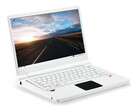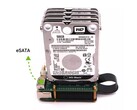Every experienced PC user likely knows that the presence of multiple identical systems in the form of computing chips with multiple processors can greatly accelerate tasks. That said, entire computer systems and not just processors can also be used in parallel, and not just for large projects such as Folding@home. For example, the Turing Pi 2.5, which is now available for pre-order, offers the option of harnessing several Raspberry Pi 4 CM or Nvidia Jetson Compute Modules in order achieve higher performance levels. AI applications are a possible area of use in this regard.
The Turing Pi 2.5 is an improved variant of the Turing Pi 2, which means that nothing has changed in terms of basic functionality, but the list of improvements is long. For example, there are major changes to the internal networking of USB connections. Changes have also been made to the ports, and compatibility with HDMI-supported panels is said to have been improved.
The computer board supports up to four individual boards. Power is supplied via a 24-pin ATX connector. Two SATA 3 ports are available, as well as two USB 3.0 ports and two Ethernet ports. The use of a microSD card is possible. Up to four M.2 2280 SSDs can be installed. A mini PC connection is also available, as is a SIM card slot, meaning that a corresponding cluster system could also be set up outside of fixed internet connections.
The system is currently available for pre-order at a price of $259.











